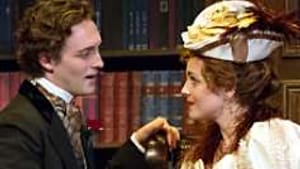Stay in the Loop
BSR publishes on a weekly schedule, with an email newsletter every Wednesday and Thursday morning. There’s no paywall, and subscribing is always free.
Oscar Wilde gets serious
Oscar Wilde's "Ideal Husband' at the Walnut (1st review)

Oscar Wilde has aged better than any other pre-20th-Century English playwright (barring the exception so obvious that I need not mention his name). His closest rival, Bernard Shaw, is remembered today only for what most people recall as his tenuous connection to My Fair Lady.
Wilde's appeal lies chiefly in an imagined ideal of Englishness. You know the scene: Stately country homes, an ocean of tea, witty banter, labyrinthine romances, cigarettes smoked langorously, elegant menswear, and flowers neatly arranged in buttonholes.
It's all so terribly distant from anything we know. But Wilde's light mockery of the norms of his time— especially marriage— feels, well, almost modern.
The Walnut Street Theater's production of An Ideal Husband lacks the country house (all the action takes place in London) and the languid cigarettes (we've grown more puritanical about tobacco, if not matrimony). But the rest of the Anglophilic relics are on full display, down to the flowery buttonholes and superb period sets. (It's a treat just to watch the stagehands rapidly re-arrange the luxurious interiors between acts.)
Upper-class detachment
But something is lacking in the Walnut's production. The upper class English may have mastered the art of bemused detachment, but some of these actors are too detached from their roles, and their characters are flat and unconvincing as a result. I got the feeling that they've seen enough BBC adaptations to imitate the accent, but they're unable to muster the actual feeling needed to convey Wilde's witticisms convincingly.
What saves this production is the interplay between two unlikely friends, an honorable up-and-coming statesman named Sir Robert Chiltern (Ian Merrill Peakes), and a charming rake (a familiar Wilde character) named Lord Goring (Luigi Sottile). Both actors are wonderfully funny, both in their delivery and, in Act III, their physical struggle over whether or not a particular door should be opened.
You actually sense a relationship between them, which is more than can be said for Goring and his father, played by Ian D. Clarke. When Sir Chiltern is threatened with blackmail it seems just right that the otherwise careless Goring would leap to his aid.
His gout or his wife
The main female characters, unfortunately, are a disappointment. Wilde imagined Miss Mabel Chiltern as a blithe and affectedly languid match to Lord Goring, capable of meeting him barb for barb, like Beatrice and Benedick. But Lynnia Shanley simply plays Mabel languidly, which isn't the same thing.
Mrs. Cheveley, the villain of the piece, is blessed with some of the play's best lines. ("Poor old Lord Mortlake, who had only two topics of conversation, his gout and his wife! I never could quite make out which of the two he was talking about. He used the most horrible language about them both.") But Kate Fahrner's heart doesn't really seem to be in the role. Her threats don't convey the force of impending ruin, and her seductions don't seem in the least tempting.
Lady Chiltern is one of the harder parts in An Ideal Husband, because she's not funny at all— just saintly, upstanding, and judgmental. She reminds me of those strident political activists who won't accept compromise and drive others away from their causes because they refuse to have the debate diluted by a joke or a cocktail. (Shaw himself, reviewing the play in 1895, inveighed against the "mechanical idealism" of Sir Robert's "stupidly good wife.")
The spirited Jennie Eisenhower does what she can with this part, but it's an unforgiving and dull role. (I couldn't help but wish that Eisenhower had been cast as Mrs. Cheveley.)
Moral lesson
Lady Chiltern embodies what's wrong with An Ideal Husband itself, as a play. Lord Goring and, ideally, Mabel Chiltern and some of the other supporting characters are capable of conveying a spritely sense of delight in the smallest aspects of the material world, and an utter disregard for the norms and staid practices of a moralistic society. But the main action of An Ideal Husband keeps dragging us into a plot involving Lady Chiltern— a pompous dunce we are meant to take seriously.
The Importance of Being Earnest remains Wilde's masterpiece because he marginalizes anything remotely serious and gives the story over entirely to the trivial, rather like a P.G. Wodehouse novel. (Or, I should say, Wodehouse's plots are rather like Earnest.) The conclusion of An Ideal Husband subjects the audience to A Very Important Lesson, outdated though it is.
"For the future," Lord Goring chides his butler, "a more trivial buttonhole, Phipps, on Thursday evenings." And perhaps a more trivial comedy, next time, for Walnut Street.♦
To read another review by Steve Cohen, click here.
Wilde's appeal lies chiefly in an imagined ideal of Englishness. You know the scene: Stately country homes, an ocean of tea, witty banter, labyrinthine romances, cigarettes smoked langorously, elegant menswear, and flowers neatly arranged in buttonholes.
It's all so terribly distant from anything we know. But Wilde's light mockery of the norms of his time— especially marriage— feels, well, almost modern.
The Walnut Street Theater's production of An Ideal Husband lacks the country house (all the action takes place in London) and the languid cigarettes (we've grown more puritanical about tobacco, if not matrimony). But the rest of the Anglophilic relics are on full display, down to the flowery buttonholes and superb period sets. (It's a treat just to watch the stagehands rapidly re-arrange the luxurious interiors between acts.)
Upper-class detachment
But something is lacking in the Walnut's production. The upper class English may have mastered the art of bemused detachment, but some of these actors are too detached from their roles, and their characters are flat and unconvincing as a result. I got the feeling that they've seen enough BBC adaptations to imitate the accent, but they're unable to muster the actual feeling needed to convey Wilde's witticisms convincingly.
What saves this production is the interplay between two unlikely friends, an honorable up-and-coming statesman named Sir Robert Chiltern (Ian Merrill Peakes), and a charming rake (a familiar Wilde character) named Lord Goring (Luigi Sottile). Both actors are wonderfully funny, both in their delivery and, in Act III, their physical struggle over whether or not a particular door should be opened.
You actually sense a relationship between them, which is more than can be said for Goring and his father, played by Ian D. Clarke. When Sir Chiltern is threatened with blackmail it seems just right that the otherwise careless Goring would leap to his aid.
His gout or his wife
The main female characters, unfortunately, are a disappointment. Wilde imagined Miss Mabel Chiltern as a blithe and affectedly languid match to Lord Goring, capable of meeting him barb for barb, like Beatrice and Benedick. But Lynnia Shanley simply plays Mabel languidly, which isn't the same thing.
Mrs. Cheveley, the villain of the piece, is blessed with some of the play's best lines. ("Poor old Lord Mortlake, who had only two topics of conversation, his gout and his wife! I never could quite make out which of the two he was talking about. He used the most horrible language about them both.") But Kate Fahrner's heart doesn't really seem to be in the role. Her threats don't convey the force of impending ruin, and her seductions don't seem in the least tempting.
Lady Chiltern is one of the harder parts in An Ideal Husband, because she's not funny at all— just saintly, upstanding, and judgmental. She reminds me of those strident political activists who won't accept compromise and drive others away from their causes because they refuse to have the debate diluted by a joke or a cocktail. (Shaw himself, reviewing the play in 1895, inveighed against the "mechanical idealism" of Sir Robert's "stupidly good wife.")
The spirited Jennie Eisenhower does what she can with this part, but it's an unforgiving and dull role. (I couldn't help but wish that Eisenhower had been cast as Mrs. Cheveley.)
Moral lesson
Lady Chiltern embodies what's wrong with An Ideal Husband itself, as a play. Lord Goring and, ideally, Mabel Chiltern and some of the other supporting characters are capable of conveying a spritely sense of delight in the smallest aspects of the material world, and an utter disregard for the norms and staid practices of a moralistic society. But the main action of An Ideal Husband keeps dragging us into a plot involving Lady Chiltern— a pompous dunce we are meant to take seriously.
The Importance of Being Earnest remains Wilde's masterpiece because he marginalizes anything remotely serious and gives the story over entirely to the trivial, rather like a P.G. Wodehouse novel. (Or, I should say, Wodehouse's plots are rather like Earnest.) The conclusion of An Ideal Husband subjects the audience to A Very Important Lesson, outdated though it is.
"For the future," Lord Goring chides his butler, "a more trivial buttonhole, Phipps, on Thursday evenings." And perhaps a more trivial comedy, next time, for Walnut Street.♦
To read another review by Steve Cohen, click here.
What, When, Where
An Ideal Husband. By Oscar Wilde; Malcolm Black directed. Through March 3, 2013 at the Walnut Street Theatre, 825 Walnut St. (215) 574-3550 or www.walnutstreettheatre.org.
Sign up for our newsletter
All of the week's new articles, all in one place. Sign up for the free weekly BSR newsletters, and don't miss a conversation.

 Jake Blumgart
Jake Blumgart